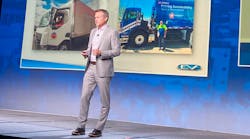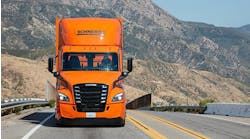Paccar’s Skoog shares EV takeaways during ACT Expo 2021
LONG BEACH, California — Current emissions regulations, starting with the California Air Resources Board new clean truck standard and several states looking to follow suit, will drive roughly 25% of electric vehicle purchases across North America by 2030, according to Jason Skoog, general manager of Peterbilt and vice president for Paccar.
To cover the needs of the entire trucking industry with zero-emission vehicles, Skoog emphasized that improved battery technology combined with a nationwide rapid charging system, as well as hydrogen fuel cells combined with a nationwide hydrogen infrastructure are needed.
Peterbilt currently has three battery-electric applications—the 220 EV, the 579EV day cab, and the 520EV refuse truck. Paccar’s Kenworth brand has taken the lead in hydrogen truck development for the company, partnering with Toyota and currently running in real-world applications in Southern California.
“Talking to customers every day, we’ve learned several things along the way,” Skoog said during an ACT Expo keynote session. “A fleet of electric trucks needs chargers that are conveniently located to serve rapid charging. Installation can require a medium- to large-scale production project. In most cases, this is an expensive, time-consuming endeavor. It requires financing and management often outside the core competency of a fleet customer.”
Along the company’s EV journey and speaking with fleets, Skoog shared the following tips:
- The key takeaway, he said, is that fleets must start the infrastructure conversation and get a site assessment the minute they’re thinking about adopting an EV.
- The second consideration is pricing, which will depend on the duty cycle and the vehicle’s exact configuration and range. Peterbilt has a dedicated grant writer staff to help sort through available incentives. Fleets can also do their own research on grant availability in their states and municipalities, Skoog noted.
- Total costs for EVs are significantly different than purchasing a diesel truck due to electricity costs, charging, mileage, and a change in maintenance.
- “Talk to your utility,” Skoog said. “We have had customers go to their utility and ask for a discount on a charging cost when they are charging overnight and they were able to get a cost reduction.”
“The technology is here now, and we are delivering these trucks today, but we are far from widescale production,” he added.
When it comes to EV adoption drivers, Skoog pointed to sales regulations beginning in 2024 with CARB, having readily available infrastructure across the country, grants and incentives to help reduce the financial burden on fleets building their own charging depots, and having tax incentives and money available at the time of purchase.
“Another option that should be considered is the elimination or reduction of the 12% federal excise tax,” Skoog urged. “If we can’t get it done for all trucks, why not start with eliminating the FET on zero-emission vehicles?”




